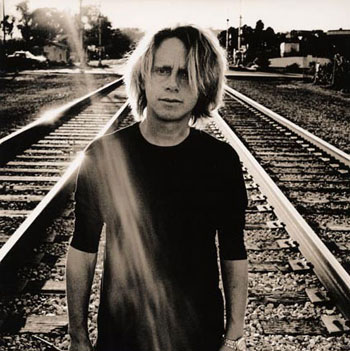Release
finally got the opportunity to talk to Martin L Gore. We were invited
to meet him in London recently. God knows we have been waiting for this.
Since 1986 actually (when we started, that is). No need to pretend we
are cool. Gore is the
guy. We are all fans.
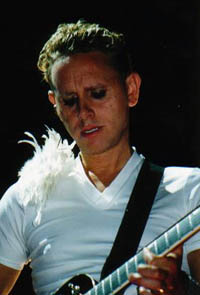
Martin Gore live with Depeche Mode in
Stockholm.
Photo by: Jens Krause (Release)
An
imaginary celebrity party of someone’s dreams
Martin L Gore is back. This time on his own. One of the founding members,
as well as songwriter for the legendary band Depeche Mode returns with
a new album, “Counterfeit 2”, on April 28, 2003. The album
is made up entirely of covers of songs that have touched or inspired Martin.
But this is no celebrity karaoke session. Oh no. Instead the songs have
been reworked into a style that can only be described as..., well, Martin's
own.
This album, the second in the ”Counterfeit” series, brings
together a varied and intriguing collection of tracks, all reworked by
Martin into a collection of songs destined to probably please both Depeche
Mode fans, as well as fans of the originals themselves.
It is the product of, Martin says, ”about seven or eight months
of studio time”. You can find a staggering variety of inspirations.
You will find Eno (”By This River”) next to John Lennon (”Oh
My Love”), Iggy Pop (”Tiny Girls”) and Bob Dylan (”In
My Time of Dying”) alongside Julee Cruise (”In My Other World”)
and Nick Cave (”Lover Man”). Even David Essex (”Stardust”
- the chosen first single) finds a place - it's like the imaginary celebrity
party of someone’s dreams, held round at Martin's studio.
An
auspicious venue for an auspicious occasion
I am about to meet Martin at Home House near London's flagship Selfridges
store - an auspicious venue for an auspicious occasion. Naturally the
other journalists and I are a bit nervous - it isn't often a person of
Gore's stature allows you to question him. Especially when the questions
are directed at something he obviously feels so personal about.
Before I have time to think too much about this, and order a double of...
well anything from the bar (to calm my nerves of course), we are ushered
upstairs, the time has come.
We are asked to sit in an adjacent bedroom to the interview room while
things are prepared. It seems like an eternity. Nobody is speaking. I
am flitting between reading my questions and taking in the sumptuous decor
of the room, with the thought ”I should have taken that double!”
whizzing around my head, as though it were trying to drown everything
else out. Before I have time to look for the room service number, we are
taken in.
The interview room is even more impressive than the last. Everything looks
extravagant and old, but I don't have time to take any of it in as I am
introduced to Martin himself. He looks very relaxed and offers me his
hand in greeting. I sit down and all of a sudden the questions that were
threatening to become so elusive, pop back into my head.
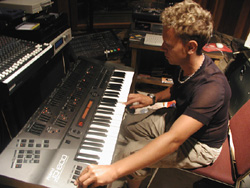
Martin
in the studio 2000.
"Doing
it fairly electronically"
”Stardust”
was chosen as the first single from an album that isn't in Martin's words
”particularly single-friendly”. The tracks work together amazingly
well as an album though; the thread being Martin's atmospherically dark
electronics which provide the backing to the songs.
- I wanted this album to be a broad representation of my musical tastes.
But I did like the idea of doing it fairly electronically. There haven’t
been many, for want of a better word, credible electronic covers records,
Martin laughs.
“Counterfeit
2” is not immediately commercial. Martin states:
- I like the idea of showing the influences - I don't see it as a commercial
venture.
From haunting keys draped over the popping beats of ”I Cast a Lonesome
Shadow”, to the grown-up lullaby-like backing of ”Lost in
the Stars”(the first song Martin wanted to cover for the album,
because ”it's the one track on the album where I broke all of my
rules”), every track has been quite radically re-worked to create
songs that immediately sound modern and yet timeless at the same time.
Martin is keen to point out that this is a joint album, even though it
is his name on the cover.
- Andrew Phillpot programmed all the computer stuff for the last two Depeche
Mode tours, and Paul Freegard worked with me on the pre-production of
”Exciter”. They both do other things as well. Paul is in a
band called Chamber; they kind of do dance music. Andrew works on various
things, he does a lot of stuff for touring actually, preparing stuff for
tours for people, Martin explains.
- They were very instrumental in the making of the record. It's a real
joint effort.
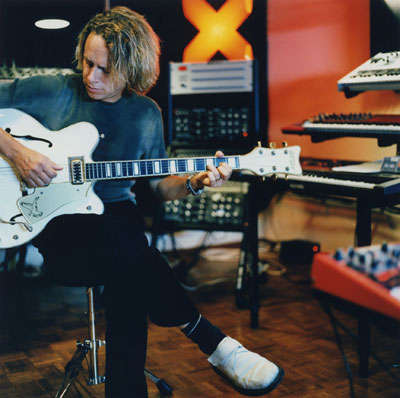
Photo by: Anton Corbijn
Depeche
Mode "not the fastest band in the world"
I asked
Martin why he didn't use his own songwriting skills for this solo album.
- I really like the idea of cover versions because I think it's interesting
when people in bands or songwriters choose songs because it show people
their influences. I was a particular fan of Bryan Ferry's cover albums
when I was a kid, it opened up a lot of music to me that I was unaware
of, which is a nice thing. Secondly, while I'm part of Depeche Mode, I
don’t feel it's right for me to use my songs for myself because
I think it makes a conflict of interest. I'm not a very prolific songwriter,
so the length between Depeche Mode albums would get even greater, we're
already not exactly the fastest band in the world!, Martin laughs and
continues:
- I think I'm drawn to something very similar to what inspires me as a
songwriter. I think there are certain parallels between the cover versions
that I choose and the songs that I write. It's very difficult to put my
finger on what exactly that is. I tend to choose songs that are very emotional,
maybe very lonely, there is a certain solitude to a lot of the songs.
Those songs for me are far more realistic; I feel like they are in the
key of life. I don't like happy songs much!
The album really works as a coherent collection of tracks, did you
have to work hard at that, or did it seem to come naturally?
- I think because of the emotion of the songs, they somehow would have
worked in whatever direction I took them, I think. I suppose that the
overall production of the album helps to make it work as a piece anyway,
but I think the songs, even if I’d put a ”Back to Mine”
out, with the original versions on - even though they're from totally
different areas of music - somehow they might have worked!
"Emotion" certainly seems to be a key word for Martin.
- I always feel that I try to capture emotions - that's what's important
to me. I don't think that if I wrote songs for myself as a solo artist,
when Depeche Mode finished, that they would be very different to what
I do now within the context of the band.
An example - ”Stardust” - the re-working you have done
is so completely different. Did you think, when listening to the original,
”how am I going to draw what I want from this, and what can I do
with it?”
- It's really different with each song. You have to somehow try and work
out what the important elements are that you're going to carry through
to your own version. In some of the songs I didn't feel I could change
the chords too much, for instance. But in a song like ”Tiny Girls”,
for me the chords weren't the important thing about the song. There was
some kind of humour or quirkiness to the original that I liked so I changed
a lot of the chords in that song, but somehow it still worked. Other songs
had other important elements that I had to pull over to my version. But
with all of them I think one of the important things is to try and give
it a new identity and somehow put some of my own identity onto it.
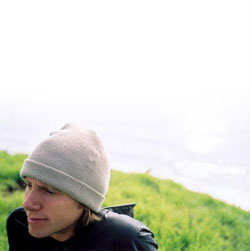
Photo
by: Jennifer Secord
Martin
inspired by the underground electronic scene
You and Depeche Mode have been tremendously influential on the electronic
music scene. Are there any people who have come through since you've been
formed that you think are good?
- There are people all the time, I think. I've been quite inspired generally
by the underground electronic music scene over the last three or four
years. A lot of the artists are really unknown. Maybe they have a few
tracks here and there, and a lot of it has been quite minimal and atmospheric.
I think that has inspired me on the last Depeche Mode album, and on this
album.
Martin then goes on to describe his influences for the album, and a possible
dream collaboration:
- I've always been a massive Elvis fan, but...! (laughs) On the record
I do a cover of a Velvet Underground song, and I think for me they were
one of the most important bands. I like their darkness but I also like
the pop-side of the Velvet Underground. ”Candy Says” was probably
my third-choice of Velvet Underground song to cover. My first two would
be ”Femme Fatale” and ”I'll Be Your Mirror”, but
because I'd already decided to record a song that Nico had done, I went
to the third-choice.
- I started to cover one of Gary Glitter's songs, and then this second
big scandal came out. It wasn't as though I was forgiving him for the
first one, but the second scandal was the nail in the coffin, and I just
thought I don't really want to be supporting this guy!
These are covers of songs that have inspired you, but are there any
artists you would be tempted to work with, rather than cover?
- I find songwriting a really personal process, so I don't know if I would
actually like to sit in a room with somebody else and write songs. But
I always like working with people on production levels and things like
that, so I'm sure I will be working with people in the future. You asked
if there was anyone I particularly like, I really like Atom at the moment.
I got him to do a remix of ”Stardust”, and he did a remix
for us on a Depeche Mode track in the past. I think he's consistently
interesting at least in the stuff he puts out.
How did you find singing in German!?
- I studied German at school. I lived in Berlin for two years. And had
a German girlfriend for five years, so I don't find speaking German particularly
difficult. Singing was slightly more difficult. I'll possibly play that
song live (”Das Lied vom einsamen Mädchen”), but unfortunately
I think that song will get overlooked everywhere in the world apart from
Germany. I'm sure people are just going to skip past that one, which is
unfortunate because the words to that song are really special. I might
do it in Germany maybe. I'm sure that song will go down well in Germany.
I've just been on a promotional week and I did two days in Germany, and
of course I got asked about that song in every single interview!
There is no extensive world tour in sight.
- I'm planning to do a few live shows to promote this record, and after
that, nothing in particular. I may decide to do some DJ things in the
summer, as again like a small promotional tour. I don't want to go out
on a big world tour.
Martin is asked about the live show.
- Andrew Phillpot is going to be onstage with me, playing laptop and keyboards
and then Peter Gordeno, who is the keyboard player who played with us
on the last two tours.
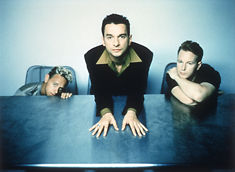
"More
fun in the sixties"
Then the question of Depeche Mode’s future of course comes up.
- At the end of the year Depeche Mode will talk again as a band about
future plans, and when we will go back into the studio, I'll just take
things from there.
Some of the tracks have very dream-like qualities, when is it you
get the inspiration for making the music itself?
- Music for me is really all about experimentation and lots of trial and
error, so it's just often mind-numbingly boring until you hit on something
that works well. It can be at any time until you hit on something that
works well, so yeah, it can be at any time but it's usually a very long
process. Electronic music is like that, I think it is the way to make
music now if you want to make it sound current and do something interesting,
but I'm sure it was a lot more fun in the sixties when you went in, you
recorded three takes and it was out the following day! You know, we're
still working on one sound for longer than that!, Martin laughs.
Was this album a lot more difficult to put out than the first ”Counterfeit”
record, as it is a lot more personal?
- No, I don't find it difficult to put out. Somebody asked me about this
personal level in another interview and I said I feel like I'm making
myself a lot more vulnerable when I'm writing songs. Doing cover versions
is almost like being able to hide behind things!
- I think it was quite narrow-minded, the first one, more maybe of what
people expected, and it was all done very quickly, it was all very simple.
I don't regret it, I still have some fondness for it. This time I've tried
to make it a broader representation of my tastes. Maybe a little bit more
intricate.
But there is no hiding from this album, although there are no original
songs here, there is a tremendous amount of originality to the way they
have been reformed. The album can best be described as being allowed to
look at Martin Gore's record collection, but hearing the music using his
ears, which should prove interesting for not just die-hard Depeche Mode
fans, but fans of intelligent and inspirational music in general. |
|
Who
is new Release writer Mike Whyte anyway?

Some
words from Mike:
I
am from a small village in the North of England - but much prefer my "adopted"
hometown of London. I am 29 years old (but don't look a day over 28!).
Since leaving University - where I
pretended to be an artist for four or so years - I have travelled to different
countries, including Cuba (where I worked as a volunteer English teacher
in Havana - and met many interesting people, a favourite hobby of mine.
I am currently an English language teacher, working near London's famous
Regent Street in the heart of London.
I am very interested in the music scene in London, and love going to gigs,
as well as some of London's more eclectic clubs - there are some very
vibrant places here, which cater to a wide variety of tastes - you can
always find something worth going to. My personal favourites are the regular
Warp and and Rephlex Assault System nights. Favourite artists of the moment?
- has to be Venetian Snares and Alec Empire.
My passion is art and more importantly electronic music: I make it, listen
to it, and make friends through it. So when I had the opportunity to interview
one of the absolute legends of this genre - Martin L Gore of Depeche Mode
fame - imagine how I felt!
I hope you like the Release Spotlight - and I hope some of the excitement
I felt rubs off on you!
|
